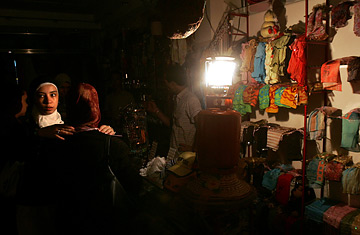
Palestinians shop at a store lit by a gas lamp during a power outage in Gaza City, Tuesday, Aug. 21, 2007.
Last Friday, the lights went out in Gaza because the electric bill wasn't being paid. The European Union which, for humanitarian reasons, is financing the Palestinian enclave's power supply, suddenly refused to continue the subsidy because of allegations that Gaza's government — run by the Islamist party Hamas — was about to tax electricity to bolster its armed militants. Ever since those same militants ousted the forces of Palestinian President Mahmoud Abbas last June — thereby creating two Palestinian territories, in Gaza and in the West Bank — Western governments have refused to send aid that would in any way assist Hamas's armed ambitions. And with the electricity thus tainted, the E.U. cut off payments. The Israeli power company supplying half of Gaza's fuel just as promptly shut off supplies.
On Wednesday, the lights were coming back on in Gaza. That was after Ismael Haniyeh, Prime Minister of Gaza's Hamas-led government, assured the E.U. that electricity funds were being properly utilized. The 1.5 million Palestinians who live in the tiny strip of land on the Mediterranean, however, were seething — not at Haniyeh and Hamas but at Abbas, who sat out this crisis in air-conditioned comfort farther inland in the West Bank with his supporters in Fatah, the other main Palestinian group. Why blame Abbas? Because the Gazans believe he is trying force them to rebel against Hamas and that he is doing this by breaking their backs.
Sources in Ramallah, one close to the Palestinian President and another from within the Fatah movement's ruling council, have told TIME that Abbas's advisers provoked the power cut by falsely warning the Europeans that Hamas was pocketing the electricity bill payments. Abbas's office has publicly denied trying to influence the Europeans; and the E.U. has declined to reveal the source of its initial allegation that Hamas was pocketing the electricity bill payments.
If the charge is true, it would not be the first attempt by Abbas to use collective punishment as a means of turning Gaza's 1.5 million Palestinians against Hamas. Abbas has revoked all passports issued in Gaza, effectively stripping Gazans of any chance to travel abroad for studies, business or medical care. He told Gaza cops that he would keep them on the payroll, but only if they didn't show up for work. And, he is using the same tactic with Gaza's garbage collectors; the city stinks with piles of trash rotting in the Mediterranean sun. So far, Abbas has failed to ask Cairo to open the Rafah crossing on the Egyptian border with Gaza, stranding thousands of Palestinians trying to enter or leave the coastal strip.
Although Abbas's tough tactics with Hamas have the backing of the Israelis and the Bush Administration, who see him as a moderate alternative to Hamas, his crackdown on Gaza is unpopular within Abbas's own Fatah movement. A powerful faction within Fatah is urging Abbas to patch up with Hamas, which was freely elected as the Palestinian government in January 2006. "He is becoming deaf and blind," says one senior Fatah official. "He's cutting himself off from the Palestinians to get closer to the Israelis and the Americans."
Meanwhile, many Gazans swelter in the dark, fuming with anger at Abbas. Whatever the theory behind the siege of Gaza, so far it has only gained Abbas more enemies — and strengthened support for Hamas.
With reporting by Jamil Hamad/Ramallah
